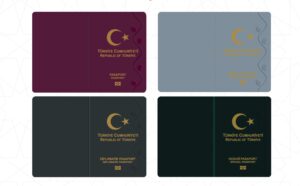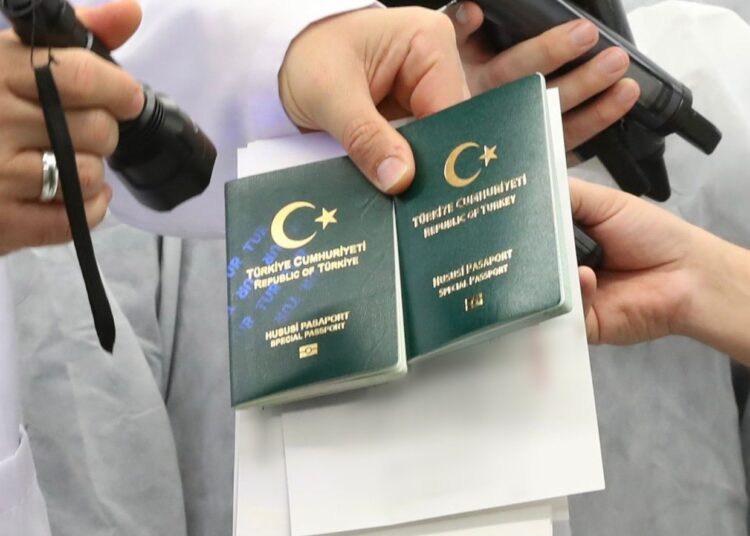Abdullah Bozkurt/Stockholm
Turkey has significantly expanded its official passport program to include tens of thousands of private sector individuals and relaxed eligibility criteria to circumvent visa requirements and restrictions imposed on Turkish nationals, particularly by the European Union, during international travel.
The move has prompted security concerns, forcing some countries to increase vigilance for such passport holders and, in certain cases, deny entry to those suspected of fraud or blatant abuse of visa-free travel privileges.
In addition to diplomatic and ordinary passports, Turkey issues two distinct types of passports to select groups of people: the special passport (Hususi pasaport in Turkish, commonly known as yeşil because of its green cover) and the service passport (Hizmet pasaportu in Turkish, or gri pasaport). Both of these passports are classified as official documents issued to individuals carrying out official duties.
These passports provide short-term, visa-free access to many countries with which Turkey has agreements, allowing passport holders to avoid the hassle of securing visas in advance of their trips.
However, their abuse in recent years and the expansion of eligibility to a large number of private citizens have raised questions about the motives of the government of President Recep Tayyip Erdogan, prompted security concerns and invited closer scrutiny and investigation by Turkey’s foreign partners.
The possible use of these passports by criminal figures, terrorists or those seeking permanent resettlement abroad complicates security checks and necessitates in-depth screening at border crossings, leading to long delays and occasional entry refusals for Turkish nationals.
The issue has become a contentious point between Turkey and the EU, particularly within the now-stalled visa liberalization dialogue that began in December 2013. The talks became deadlocked because Turkey declined to fulfill the EU’s criteria for a visa-free regime, which included restoring the rule of law, strengthening anti-corruption policies, respecting fundamental human rights, enhancing privacy protections, improving cooperation in criminal matters with the EU and amending its anti-terror laws.
Initially, special passports were issued to a limited number of government sector individuals, such as those with seniority, members of parliament and mayors, to facilitate their official travel abroad. However, passport holders began extensively using these documents for personal and leisure travel. At the same time the Turkish government expanded the scope of these passports, issuing them to a wider group of people.

In 2017 the Erdogan government allowed managers and owners of companies exporting at least $1 million in goods or services to apply for special passports. Consequently, more than 22,000 exporters gained eligibility for these passports. Two years later the threshold was lowered to half a million dollars, removing the requirement for a consistent export volume over the previous three years and thereby making thousands more businesspeople eligible for special passports.
As of April 2022 according to the state-owned Anadolu news agency, quoting statistics from the Ministry of Commerce, 23,933 exporters had obtained special passports. By November 2023 President Erdogan announced that approximately 35,000 exporters had received special passports.
This situation is alarming because Turkey’s golden visa and residency programs have facilitated notorious organized crime figures and jihadist militants acquiring Turkish citizenship through property purchases, establishing or taking over companies and laundering illegal proceeds through the Turkish financial and banking systems. Some individuals have even changed their names to Turkish ones to evade detection and become eligible for special passports.
Senior figures from Hamas, designated as a terrorist group by the US and the EU, and international fugitives sought under outstanding INTERPOL Red Notices acquired Turkish citizenship with the approval of President Erdogan through investments in real estate and business ventures.
In January 2017 the Erdogan government announced a golden residency program through which foreigners could acquire Turkish citizenship by purchasing real estate valued at $1 million or investing $2 million in a business. A year later, these thresholds were reduced to $250,000 for real estate purchases and $500,000 for business investments. Following criticism from the opposition, the government increased the property purchase limit to $400,000 in May 2022.
According to a statement from the Ministry of Environment, Urbanization and Climate Change in April 2022, 19,630 foreigners acquired Turkish citizenship through this program between 2018 and 2021, with the majority coming from Russia, Iraq, Iran and Afghanistan. No updated figures have been provided by the government since then.

Some individuals who have acquired Turkish citizenship are now eligible to obtain special passports since they appear to meet all the criteria listed on the Interior Ministry website.
In 2019 the Erdogan government expanded the program by granting lawyers with 15 years of experience the right to apply for a special passport, following lobbying efforts by Metin Feyzioğlu, the then-head of the Turkish Bar Association (TBB) and an Erdogan ally and staunchly anti-Western neo-nationalist figure. As a result 40,000 lawyers, including attorneys from extreme left, far-right and jihadist backgrounds, became eligible to obtain a special passport.
The total number of people eligible to apply for a special passport is increased exponentially because the privilege extends to immediate family members, including the applicant’s adult children under 25 years of age.
Now, professional groups in the media, pharmaceutical and medical industries, notaries public, financial consultants, tour guides and many others are also seeking the privilege of obtaining a special passport.
Draft laws have been proposed in the Turkish parliament to further expand the scope of special passports. In June 2016 a lawmaker submitted a bill to include approximately 50,000 muhtars (locally elected administrators in charge of neighborhoods or villages) among the groups eligible for special passports. In March 2024 Parliament Speaker Numan Kurtulmuş proposed that journalists with 15 years’ experience also be eligible for special passports.
The exact number of special or service passports issued by the government so far remains unknown, but reports in the Turkish media and comments from public officials in the past provide some indication. There were previously mentions by officials suggesting a total of around 2 million passports, which was discussed in talks between Turkey and EU officials.
In October 2019 during parliamentary deliberations, ruling party deputy Ali Özkaya, who co-sponsored the bill to grant special passports to lawyers, stated that Turkey had already issued 1.7 million out of the 2 million quota allocated for special passports.
Today, it appears that Turkey is on the verge of exceeding or has already exceeded this upper limit of 2 million special passports issued.

In May 2023 then-interior minister Süleyman Soylu stated that “there is a certain number [of special passports] allocated to us by countries worldwide. We are about to exceed this number. In fact, we can say that we have already exceeded it.”
Special passports are issued by the Interior Ministry.
Soylu said the Foreign Ministry had been critical of the increased number of special passports. “God forbid that we face a situation where all special passports might be converted into ordinary passports,” he added.
In July 2013 then-foreign minister Ahmet Davutoğlu warned that expanding the eligibility for special passports could lead to their use beyond their intended purpose. He said issuing such passports to individuals other than official personnel could result in other countries’ authorities limiting the privileges associated with these passports or even imposing visa requirements on their holders.
The ease of travel afforded by special passports has stimulated demand for forged versions on the black market. In September 2022, in a police raid in Istanbul, authorities confiscated forged special passports from suspects involved in counterfeit schemes and human smuggling networks.
Turkey’s complex passport classification can sometimes confuse airlines. While Turkey considers special passports to be documents given to officials, some airlines have been notified by foreign governments that they are considered ordinary passports and thus require a visa. One such incident occurred in May 2024 when Levent Sevgi, a Turkish academic holding a special passport, was denied boarding on a Kenya-bound flight by Qatar Airways because he did not have a visa.
The use of special passports beyond their intended official purpose has prompted some countries to impose new restrictions on travelers using these passports for leisure travel. For instance, Germany has begun requiring that special passport holders document their travel, possess travel health insurance and demonstrate sufficient financial resources for their short stays.
Although not as problematic as special passports, service passports, which are issued in limited numbers and must be returned to the Interior Ministry after travel, also present challenges for Turkey. In 2020 over 40 Turks who were provided service passports by Malatya province’s Yeşilyurt district municipality were sent to Hannover, ostensibly to attend an environmental workshop hosted by a German company. None of them returned.
It was later revealed that the project was a scam and that the municipality was aware of its fraudulent nature but still endorsed the travel as official to obtain service passports for Turks who had no intention of returning to Turkey. Similar passport scams were also uncovered in other Turkish municipalities. It was alleged that applicants paid between 5,000 to 8,000 euros to obtain service passports through these municipalities.
According to a statement by then-interior minister Soylu, 804 out of 2,872 people who traveled to Europe as a group from municipalities after 2018 did not return despite their service passports expiring.
It appears that approximately half a million Turks who travel abroad annually using special and service passports will face closer scrutiny. The possibility of reclassifying such passports as ordinary passports is not far from becoming reality.












